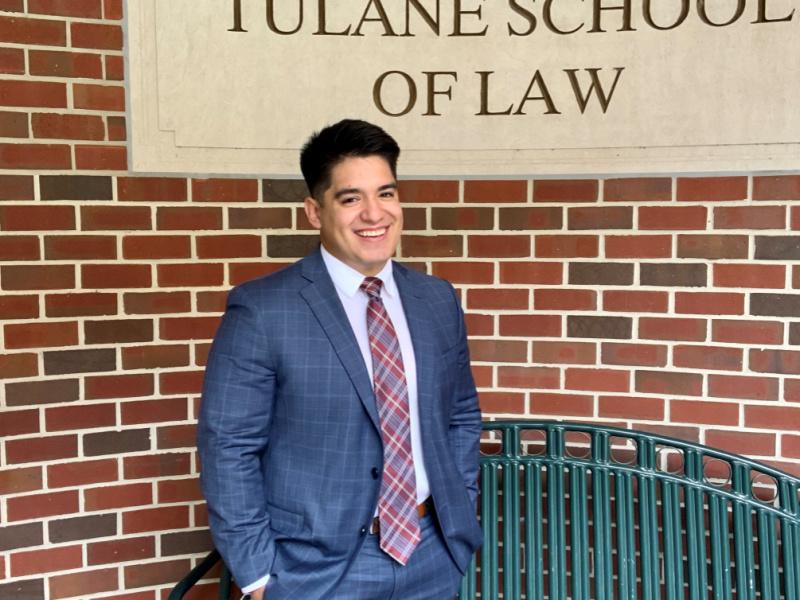Law student clocks 478 hours of pro bono service, wins LSBA Award
Maybe it was the impact of growing up the son of immigrants from Mexico, or that his grandmother had toiled in California’s farming fields most of her life that brought Constantino Raya to the law. What is certain is that he now knows his purpose lies in working to help vulnerable populations.
“Even before law school, it has been personal,” said Raya (L’21), whose whopping 478 hours of pro bono work have earned him the 2021 Louisiana State Bar Association Law Student Pro Bono Award.
He is the first in his family to graduate from college (University of Kansas undergrad), and now the first soon-to-be lawyer.
“Pro bono leadership requires treating pro bono work with the same care, commitment, and dedication as any other work,” said Prof. Tonya Jupiter, Director of Tulane’s Pro Bono programs. “Constantino has demonstrated leadership in his steadfast commitment to performing pro bono service at the highest possible level.”
Raya will be recognized at an LSBA ceremony hosted virtually on Thursday, May 20, with Louisiana Supreme Court Chief Justice John L. Weimer and LSBA President Alainna Mire present to celebrate his accomplishments.
Tulane Law was the first in the nation to require pro bono service as a requirement for graduation. Today, that requirement is 50 hours. Students work in the community and across the U.S. working to help the most vulnerable in all areas of law, from public interest to environmental law to nonprofit work.
Back home in Sacramento before law school, Raya had been working within state government, assessing California’s most needy communities, and seeking to incentivize businesses and health care companies to meet a pressing need for access to medical treatment, mental health services, jobs and more.
In his first year at Tulane Law, Raya volunteered with the California Department of State Hospitals where he recorded 424 hours of service. While serving with DSH, Constantino assisted attorneys in all aspects of civil and criminal commitments, including performing legal research, conducting factual investigation, and drafting memos and motions. His supervisor, Amy August, praised Constantino’s “positive” and “ready-to-learn” attitude.
For Raya, it was “eye-opening. I began to understand the state hospital system and the need for mental health services.”
His work allowed hospitals to send patients back to court for trial at a faster rate, “and I saw the benefit of providing treatment versus sending someone back to prison, but also the negatives of a carceral program.”
As a 2L, Raya volunteered with Catholic Charities for the Archdiocese of New Orleans in the Immigration Unit. Over a two-month period, he recorded more than 54 hours, conducting client interviews and drafting pleadings.
“That experience provided me access to the plight and struggles immigrants face when trying to establish legal status in the United States,” Raya said, many of them children. “I saw how difficult it was for these kids to make their way to this country, and then I saw how they were treated once here. They face trauma and even there you see the need to provide mental health services for these vulnerable populations.”
His passion, he said, is to continue to steer into healthcare law and policy, perhaps working to provide access to quality care at the border, where migrants in camps will not go to hospitals for fear of being returned home to countries that are increasingly unstable.
He was not always so sure about law school. It took a full-year to feel confident, and a summer internship and then, meeting Supreme Court Justice Sonia Sotomayor in 2019 during her visit to Tulane. “It was inspiring to see someone from the Latinx community make it to the highest levels of law,” he said.
But mostly, he rattles off the names of his fellow Latinx classmates, like Trinidad Reyes and Ariel Campos, both 3Ls, who inspire him, who supported him. “I’m really grateful for them, and for our culture, for pushing us to keep going. That we can do this.”

